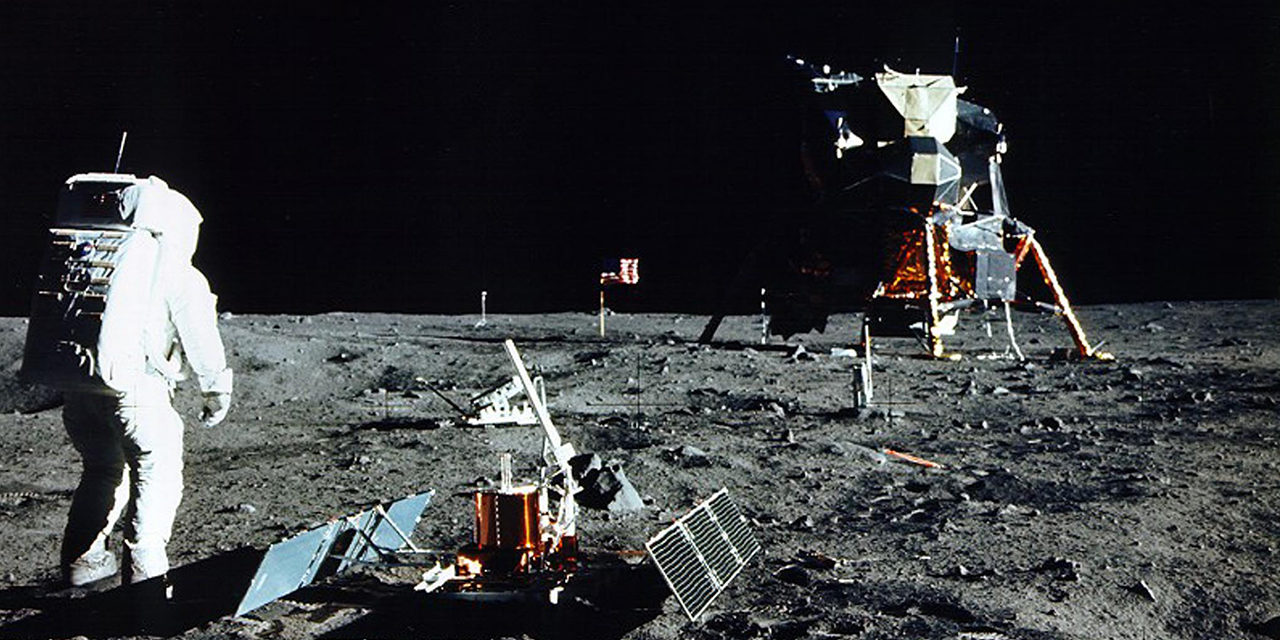Hailing it as “The best day ever!” Amazon founder Jeff Bezos blasted 66 miles into outer space on Tuesday before landing safely back on earth just eleven minutes later with his fellow astronauts aboard “Blue Origin,” his company’s oval-shaped craft.
The timing of the endeavor was designed to coincide with the 52nd anniversary of Apollo 11’s historic mission to the moon. On that date, NASA’s Neil Armstrong and “Buzz” Aldrin landed and walked on the lunar surface – the first men to achieve such a distinction.
“Because of what you have done, the heavens have become part of man’s world,” President Richard Nixon told the explorers, calling from the White House. “And as you talk to us from the Sea of Tranquility, it requires us to redouble our efforts to bring peace and tranquility to earth.”
In the half-plus century since that wondrous July night, space exploration has continued to fascinate and entice human imagination. From return trips to the moon to unmanned rovers on Mars and even the creation and launch of a golden record titled “The Sounds of Earth” to parts unknown, the appetite to explore has gone unabated and unsatiated.
Once upon a time, though, the space race was relegated to governments – entities with financial and scientific means capable of pulling off such (literal) astronomical goals. But then came the likes of Elon Musk, Richard Branson and Jeff Bezos, all business titans with money and something else – a willingness to risk both personal fate and fortune.
The world has long rewarded pioneers – men and women who did what few others would dare try. Fortune does, indeed, favor the brave, and we should applaud those who put their gifts to good use. It’s inspiring to see people set big goals and achieve incredible dreams.
But as we step off into this new frontier of personal space flight, it might be useful to consider what is compelling such individuals to pursue these remarkable goals – and what their motives say about our culture’s priorities.
Like most everything else, man’s walk on the moon didn’t happen in a vacuum or overnight. It was the culmination of decades of work and countless individuals playing their role – sometimes small, sometimes not.
Yet, those goals were rooted in the belief that man was neither the measure nor the center of all things, and that he was simply exploring and enjoying God’s creation. He was a guest, not a conqueror.
When Apollo 8 orbited the earth on Christmas Eve in 1968, the astronauts were given an opportunity to address the people of earth on television in what promised to be the largest broadcast in world history.
What would they say? Someone suggested contemporizing The Night Before Christmas. Other ideas were proposed and rejected. It wasn’t until a friend of Commander Frank Borman made a simple suggestion that they landed on the plan.
“Why don’t you start at the beginning?” asked Christine Layton, referring to reading from the Book of Genesis. So that’s exactly what they did, with each of the astronauts sharing a portion of the creation story. Over a billion people tuned in and heard God’s story of earth’s origin.
Eight months later, as plans came together for Apollo 11, Buzz Aldrin expressed a desire to read Scripture and take communion from the moon’s surface.
“I wondered if it might be possible to take communion on the moon, symbolizing the thought that God was revealing Himself there, too, as man reached out into the universe,” he wrote in 1970. “For there are many of us in the NASA program who do trust that what we are doing is part of God’s eternal plan for man.”
NASA officials were concerned the activist and atheist Madalyn Murray O’Hair would file a lawsuit – so they asked him to read the Bible silently and take the communion without public comment.
Before stepping out for the world’s most famous walk, Aldrin read to himself a verse he had written on a 3X5 notecard from John 15:5 “As Jesus said: ‘I am the vine, you are the branches. Whoever remains in me, and I in him, will bear much fruit; for you can do nothing without me.’”
It’s possible, of course, that those now pursuing space exploration via private enterprise have similarly framed their individual missions from a divine perspective, but there’s no evidence to suggest that’s the case. Even if it were, would it be politically correct to share such conviction?
Shortly after landing back in Texas, Bezos expressed thanks not to God but for “every Amazon employee, and every Amazon customer. Because you guys paid for all this.”
In contrast, Aldrin’s choice of Jesus’ words in John’s gospel reflected a belief that the adventuring astronauts saw themselves being used by God to call attention to His creation.
It’s clear today’s pioneers, flush with cash and confidence, are eager and excited to reach beyond their grasp – but what are they really reaching for, and to whom will they give credit for what they see and may someday hold?
“Apart from me you can do nothing,” Jesus reminded us two-thousand years ago – a timeless word in an age where many may falsely feel they are now in reach of nearly everything.
Photo from NASA/REUTERS






